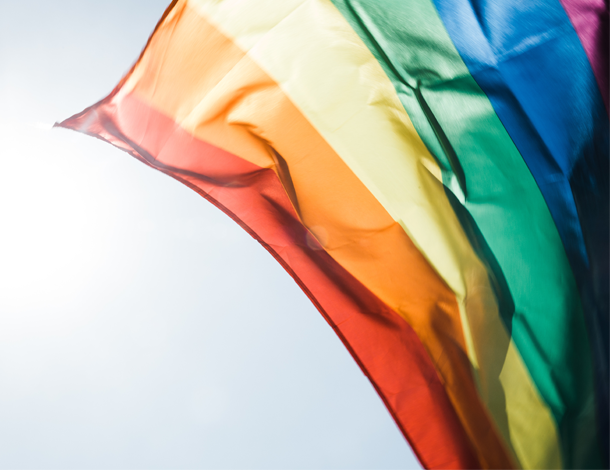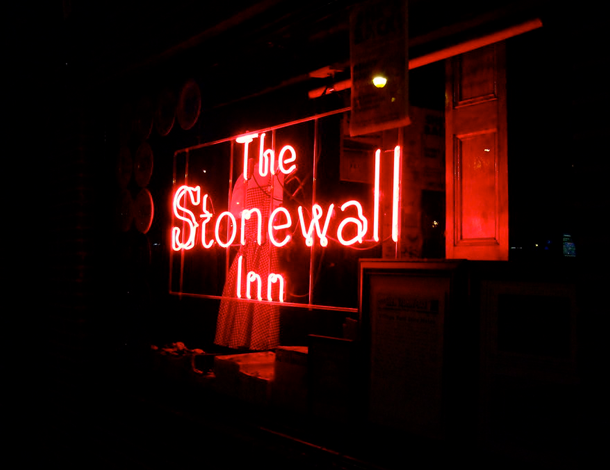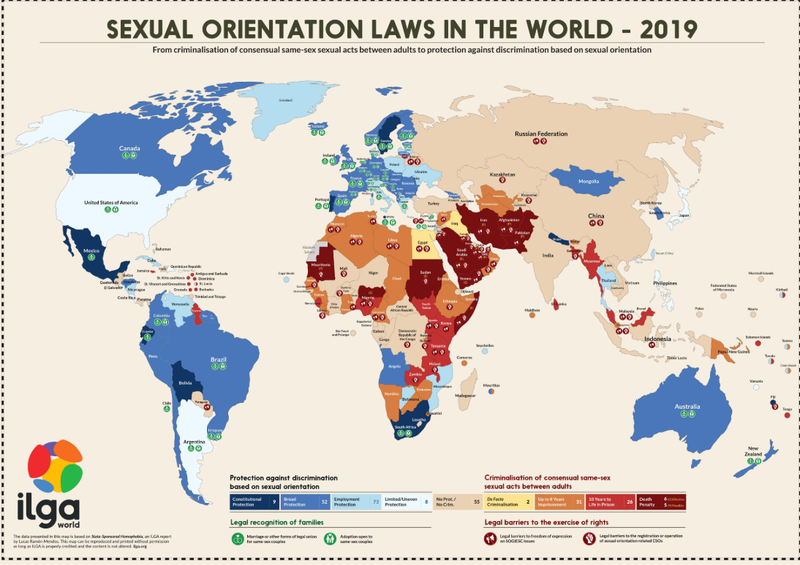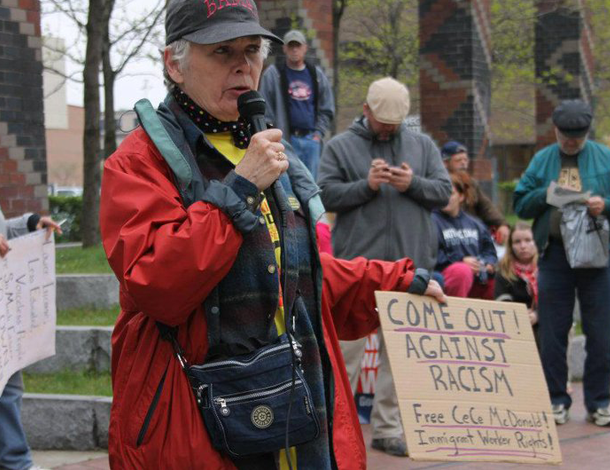On the 50th anniversary of Stonewall, a reflection on visibility in resistance and pride in the struggle.

Fifty years ago, in front of the Stonewall bar, a human barricade formed to block a police raid. That could have been just another raid, as happened on many a night. But in the early morning hours of June 28th, black, latino, trans, butch and drag queen bodies said, “Enough!” as they confronted the New York City police.
Those bodies matter in both personal stories and collective histories. The Stonewall uprising may not hold the same weight or significance in all regions of the world, but over time that act of resistance grew as it was replicated in other countries which were discovering and exploring the roots of their own local movements.
Visible bodies, desires that matter, collective awakenings that matter. Actions to change the world, which then come under attack by the powerful—those policing bodies and desires—who try to control us.
Mine is the body of a feminist Sudaca1 intersex non-binary dyke . I can already hear those voices asking, “Why so many labels if we are all human beings?” Because I have learned from social movements the need to express our experiences from our own standpoint, and to position ourselves from our own particularities, to be visible, to make visible our existence, demand our rights, and from there, form intersectional connections with activists from other movements.
Being out as a dyke has often been my greatest shield. By exposing those who are discriminated against, we have come together in empathy and multiplied our solidarity. It was about being free no matter the cost, about being able to name myself, while at the same time joining up with those other bodies which presented themselves up close, different. Group meetings, marches, reading texts that opened our minds and a path before us.
It took me a long time, along side reading texts by intersex and trans activist Mauro Cabral and going to some of his talks, to decide making myself visible as an intersex person. I began reflecting on how the medical system controls and operates on our bodies, and how it also relies on the psychiatric system. It also enabled me to add my voice to those calling for depathologizing intersex and trans children.

Poetry was an entry point for awakening my lesbofeminist consciousness; but it was only when I could write poetry from my lesbian and intersex experience in recent years, that I could really know myself, and meet other poets and artivists who were mobilizing in similar struggles. “The personal is political” expanded into “the personal poetic is political.” My love for Adrienne Rich, Diana Bellessi, Susana Thénon, Audre Lorde, June Jordan, Muriel Rukeyser, Leslie Feinberg, and Minnie-Bruce Pratt multiplied into even closer faces, voices, bodies and poetry, Macky Corbalán, Val Flores, Ire Ocampo, Susy Shock, Camila Sosa Villada...
This path, with its shortcuts and slippery ravines, I have not walked alone. Along the way I have met, liked, loved and admired those traveling companions who have literally saved my life on more than one occasion.
Visible bodies that matter. Poetic bodies that matter. Collectives, like bodies, that come together to confront challenges and celebrate victories.
I like to look at maps
I like to look at maps, especially old ones, mostly for how beautifully they are designed. Those maps invite me to think about possible adventures, to reflect on the old configurations of countries, the geopolitical transformations.
But there are other maps, like the one ILGA makes every year, which enable me to stay informed, observe, analyze our situation, as LGBTIQ (lesbian, gay, trans, bisexual, intersex and queer) people in the world. The map pictured here**, for example, shows the legislation, or lack thereof, on sexual orientation. That covers everything from the criminalization of consensual same-sex sexual acts between adults, to protection against discrimination based on sexual orientation. There is another map, produced by oiiEUROPE, that shows good practices in some European countries regarding intersex people.
I run my finger over the screen, over the countries where some progress has been made. At the same time, I worry about those regions where so much has yet to be done to protect our rights, where our mere existence makes us a target for attack. It doesn’t need to be someone attacking us with a club, or using rape to “correct” us, or shooting us with a gun. Lesbo/trans/bi/homophobic violence comes in many forms

Many LGBTIQ people live in poverty or indigence, without guaranteed access to basic services like health, education, adequate food. This happens even in countries where the law recognizes different kinds of rights.
‘Pepa’ Gaitán, murdered for being a butch lesbian***, Diana Sacayán, murdered for being trans, Muhlaysia Booker, a black trans woman murdered recently in Dallas, Texas, Marielle Franco, a black lesbian politician murdered in Brazil…The list goes on and on. In Argentina alone, in the first part of this year, 30 trans people have been murdered. I wanted to share a few of the names that I do not want to forget, that I think we should not forget.
I would like to add, in celebration, the name of Caro Gero, the first person in Argentina to obtain a birth certificate without the assignment of an F for Female or an M for Male—which will enable Caro to get an identity document recognizing a non-binary gender. I would also add the name of trans activist Lara Bertolini, who obtained an ID with “transvestite femininity” because she does not identify with the binary gender category of “female.”
A grey day
When I started to write this reflection, the day was literally gray. As I looked out the window, a thick fog kept me from seeing anything. It was one of those days that seem like a metaphor for the neoliberal context in which I am living.
Searching for inspiration, I wrote to the lesbian poet Minnie-Bruce Pratt, spouse of the late Leslie Feinberg, a trans lesbian activist who developed the Marxist concept of “transgender liberation.” I asked her what the 50th anniversary of Stonewall meant to her. Her response arrived just minutes ago. It begins in Spanish, “Para mi, Stonewall es La Lucha” [For me, Stonewall is about the Struggle] and then continues in English, “the first Stonewall was a hand-to-hand battle by queer, lesbian, gay, gender diverse and trans people, many of them, the majority of them, people of colour, who knew that the only way to stop the beatings, rapes, extortion, murders, lack of respect, ostracism, and punishments by police and bosses was to FIGHT. That is the lesson of Stonewall: FIGHT, always.”

And what does a fellow lesbian activist from the country where I live think? I asked María Luisa Peralta, and she responded that the 50th anniversary of Stonewall is inevitably moving for her. “I think about what our LGBT movements have done in different parts of the world, often with very few resources and up against adverse circumstances. I think about individual courage, collective creativity, of our capacity to organize and work, and above all, of the need to avoid becoming bureaucratically complacent in a heterocispatriarchal capitalist and racist system,” she said. “We have to continue being a movement for sexual liberation, and to cling to a spirit of transformation, contestation, irreverence, and freedom.”
The tireless Minnie-Bruce and María Luisa inspire me to keep going. We continue to build movements so we can be who we want to be no matter who is in power—especially at a time when the far right and actions of anti-rights groups are on the rise.
They remind me/us how important it is to position ourselves as practitioners of intersectional, plural, diverse activism so, from there, we can denounce the various systems of oppression and discrimination.
I smile as I read Minnie-Bruce’s closing line, which I will turn into the closing of this reflection: “Pride in the Struggle.”
1Sudaca has been used as a pejorative word for people from South America or other parts of Latin American. Some people, activists and artivists are reclaiming the word to say it out loud proudly and giving it another meaning.
Gabby wishes to dedicate this piece to Amalia Salum, Ire Ocampo, Gabriela Adelstein, Maria Luisa Peralta, Fabi Tron, Alejandra Sardá-Chandiramani. and Macky Corbalan (in memoriam).
This article was originally published on Open Democracy
